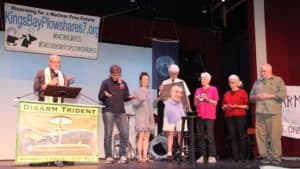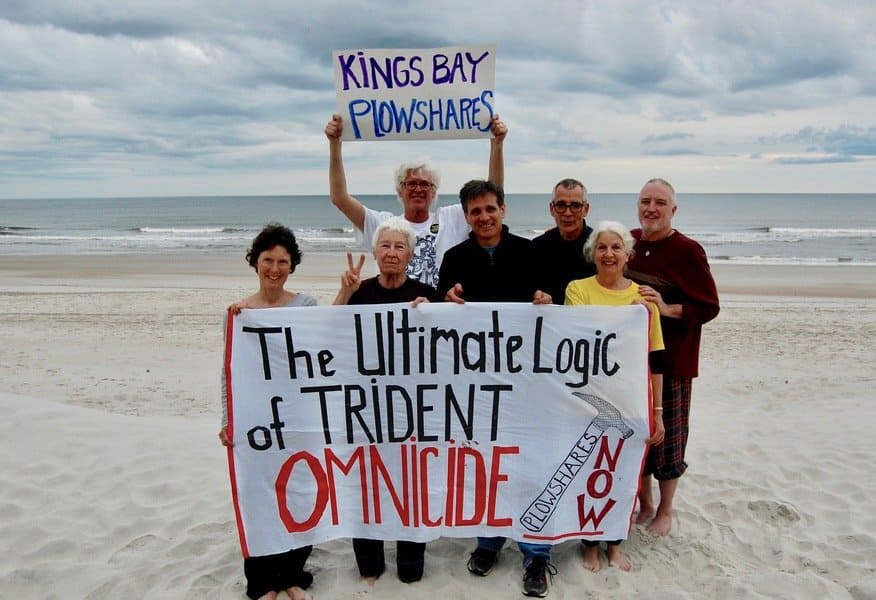The same day that Catholic vandals stole and desecrated indigenous statues of Mary by throwing them into the Tiber River, a Jesuit priest in prison garb, along with six other Catholic activists, appeared in court for breaking into and vandalising a nuclear submarine base. Both groups were trying to make a statement about their thoughts on the fidelity to the Christian way of life. One includes throwing statues blessed by the Pope over a bridge, another includes painting scripture quotes on the sidewalk of a naval base.
Trial for The Kings Bay Plowshares 7 began on Monday in Brunswick, Georgia. The group of seven activists includes Jesuit Father Steve Kelly, Martha Hennessy, granddaughter of Dorothy Day, and five other Catholics connected to the Catholic Worker Movement. They are being tried for conspiracy, destruction of government property, depredation of government property, and trespassing.
According to their website, “They face 25 years in prison for exposing illegal and immoral nuclear weapons that threaten all life on Earth.” Their trial lands during the last weeks of the United States Conference of Catholic Bishops’ National Respect Life Month.
A statement before their action reads:
We come to Kings Bay to answer the call of the prophet Isaiah (2:4) to “beat swords into plowshares” by disarming the world’s deadliest nuclear weapon, the Trident submarine. We repent of the sin of white supremacy that oppresses and takes the lives of people of color here in the United States and throughout the world. We resist militarism that has employed deadly violence to enforce global domination. We believe reparations are required for stolen land, labor and lives.
On April 4, 2018, the anniversary of the assassination of Rev. Dr. Martin Luther King, the group broke into Kings Bay Naval Base in the middle of the night to “nonviolently and symbolically disarm the Trident nuclear submarine base.” They spray-painted scripture quotes on the sidewalks and facilities, hung banners on the administration building, symbolically poured their own blood on the buildings, and used hammers to damage statues of nuclear missiles. The action was part of a larger movement of nearly 100 demonstrations like it since 1980 inspired by the Prophet Isaiah.
“Nuclear weapons kill every day through our mining, production, testing, storage, and dumping, primarily on Indigenous Native land,” their statement continued. “This weapons system is a cocked gun being held to the head of the planet…We seek to bring about a world free of nuclear weapons, racism and economic exploitation.”
In an interview a few weeks before her trial, Martha Hennessy said, “We call [the nuclear arsenal] security, but it is security for exploitation…true security is that all people are fed, clothed, housed and treated humanely.”
“The Works of Mercy are what security is truly about,” nuclear weapons, she says, move us in the opposite direction.

Activists praying at the “Festival of Hope” the night before the trial in Brunswick, Georgia. Photo courtesy of Kings Bay Plowshares Support Team.
Far from securing human life, the protesters say that “the ultimate logic of Trident is omnicide.” Their statement recalled the words of Pope Francis who said, “The threat of their use as well as their very possession is to be firmly condemned…weapons of mass destruction, especially nuclear weapons, create nothing but a false sense of security.”
In a letter from jail, Fr. Steve Kelly, SJ told a group of supporters who gathered for a “Festival of Hope” leading up to the trial’s start:
I write in relay like a tenuous voice in the wilderness, as I’m among the wilderness of the incarcerated two and a quarter million folks comprising the human warehouses in the empire…It is the Kings Bay Plowshares’ attempt to continue with what began in nonviolence – and hopefully without arrogance – to convert the judiciary according to Prophet Isaiah 2:4.
It is conversion that these Catholics are working towards, but not only of the United States government. “We all have rancor in our hearts,” Martha Hennessy shared. For her, the action was not merely about disarming nuclear weapons, but her own heart. “We can all get along so much better if we are able to control our own internal imperialistic urges,” she said.
“It is a lifetime of wearing down our own sharp edges to be receptive to having a heart of flesh rather than a heart of stone.”
Perhaps more than simply exposing “illegal and immoral nuclear weapons” the activists exposed the deep contradictions between the Gospel of life and a culture of death, hailed by St. John Paul II, whose feast day also falls during the trial.
In his 1995 encyclical, Evangelium Vitae, he wrote, “There is certainly an enormous disparity between the powerful resources available to the forces promoting the “culture of death” and the means at the disposal of those working for a “culture of life and love”. But we know that we can rely on the help of God, for whom nothing is impossible.”
The Plowshare activists share a similar conviction. “None of this can be done without God and without community,” Hennessy says. They know their small actions are up against powerful forces of death. It is “like fighting a dragon with a toothpick,” Hennessy said laughing. Nevertheless, she believes, “We are not called to be effective, we are called to be faithful,” invoking words by St. Mother Teresa of Calcutta.
Though it may not include actions as radical as these, we are all called to witness to the Gospel of life. Perhaps these Catholics on trial can challenge us to reflect on how we are called to more faithfully resist a culture of death and to protect, feed, clothe, house and cherish life. Their action reminds us that this will not always be convenient.
You can find more information and follow the rest of the trial here.


